Nutrition interventions integrated into an existing maternal, neonatal, and child health program reduce food insecurity among recently delivered and pregnant women in Bangladesh.

View/Open
Date
2019-01-13Publisher
Oxford AcademicAuthor
Frongillo, Edward ANguyen, Phuong H
Sanghvi, Tina
Mahmud, Zeba
Aktar, Bachera
Alayon, Silvia
Menon, Purnima
Metadata
Show full item recordCitation
Frongillo, E. A., Nguyen, P. H., Sanghvi, T., Mahmud, Z., Aktar, B., Alayon, S., & Menon, P. (2019). Nutrition interventions integrated into an existing maternal, neonatal, and child health program reduce food insecurity among recently delivered and pregnant women in Bangladesh. Journal of Nutrition, 149(1), 159-166. doi:10.1093/jn/nxy249Abstract
Background: Antenatal care may be a means to reduce food insecurity in pregnancy and postpartum periods.
Objective: With the use of a cluster-randomized design, we tested whether participation in nutrition-focused antenatal
care intending to improve household knowledge about the importance of nutrition for pregnant and lactating women
and encourage allocation of household resources to ensure sufficient quality and quantity of foods, without providing
food assistance, would reduce household food insecurity.
Methods: Alive & Thrive integrated nutrition interventions into an existing Maternal, Neonatal, and Child Health (MNCH)
program in Bangladesh. The nutrition-focused MNCH package was delivered in 10 subdistricts through antenatal care
visits with the use of interpersonal communication, community mobilization, and monitoring of weight gain, aiming
to improve maternal diet quality, quantity, and micronutrient intake during pregnancy and breastfeeding. The package
included components that could reduce food insecurity, measured using the Household Food Insecurity Access Scale.
To examine the impact of the nutrition-focused MNCH package compared with the standard MNCH package, we used
linear and multinomial logit regression models, adjusted for subdistrict clustering, to test differences at endline in items,
domains, and categories of food insecurity, after first confirming no differences at baseline.
Results: At baseline, nearly half of households were food insecure. At endline, the groups differed in food insecurity,
whether expressed as items, domains, or categories, with food insecurity in the nutrition-focused MNCH group 22
percentage points lower than in the standard MNCH group and 20 percentage points lower than at baseline.
Conclusions: Participation in nutrition-focused antenatal care reduced household food insecurity among recently
delivered and pregnant women. Integration of social and behavioral nutrition interventions into antenatal care with
components that promote food security provides a potentially effective means to reduce food insecurity, without
incurring high costs of providing supplemental food, in populations where limited resources can be directed towards
accessing adequate and appropriate foods. Registered at clinicaltrials.gov as NCT02745249. J Nutr 2019;149:159–166.
